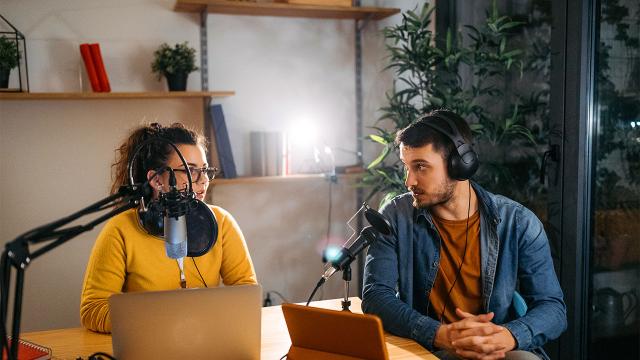If the world of podcasting is one you’re keen to dabble in, but the idea of spending a shit-tonne of money on all that podcasting equipment is deterring you… I’m here to tell you that you can create a pretty sweet podcast set up without burning a gigantic hole in your pocket.
While you do need a solid amount of tech if you want to produce a decent-sounding show, there are ways you can simplify your purchases AND keep it budget-friendly.
Below, we’ve rounded up all the podcast equipment you’ll need to start recording.
Podcast Starter Kits
If the thought of buying all that tech is overwhelming, we recommend buying a podcasting kit that fits your budget and podcasting style. This way you won’t end up spending your cash on unnecessary equipment. You can get a range of kits online that include microphones, shock mounts, pop-filters, USB cables or XLR cables and phantom power supply, depending on your desired set up.
Neewer USB Microphone Kit, $62.99
This little plug and play kit from Neewer is a good beginner-friendly option if this is your first time podcasting. It offers a simple, high-resolution sound recording set up including a boom arm, shock mount and a pop filter, no phantom power or driver needed.
Pyle USB Microphone Podcast Recording Kit, $126.93
If you’re just starting out, this Pyle plug and play recording kit is a great option. Ideal for desk set ups, it comes with a freestanding, shock filtering mount and adjustable pop filter. It also comes with an aluminium storage/ travel case so you can take it with you on the go.
Tonor Pro Condenser Microphone Kit, $166.18
If you’ve got a little bit of experience handling audio equipment, the Tonor Pro Condenser Microphone Kit is a great budget-friendly option. It features a condenser mic (XLR) which has a cardioid polar pattern to improve sound isolation, a scissor arm stand, table clamp, pop filter, windscreen, XLR cable, and 48V phantom power supply.
It also includes a sturdy shock mount meaning you won’t pick up and shocks or vibrations while podcasting.
If you’ve got a little more room in your budget, Tonor also offers a USB Condenser Recording Microphone, $189.25 that offers plug and play capabilities.
Noise Cancelling Headphones
When it comes to podcast equipment, you’re definitely going to want over-ear, noise-cancelling headphones. A good pair of headphones will allow you to pick up on any audio disturbances/mouth noises as they happen — making it easier to re-record or edit it out later.
FYI, If you are going to have a guest format for you podcast, it could be worth investing in two pairs of noise cancelling headphones in case you’re recording in person and your guest needs a set.
- Sony MDRZX110NC Noise Cancelling Headphones, $49
- Srhythm Noise Cancelling Headphones Bluetooth, $99.99
- TaoTronics Hybrid Active Noise Cancelling Headphones, $99.99
Audio Mixers
If you’ve got some experience in audio, a mixer is definitely worth splurging on. Using an audio interface allows for multiple input and output channels, with independent controls for each input. This means each speaker can have their own microphone and you can control the individual audio levels. If you’re doing a solo podcast you can probably get away with a plug and play kind of set up sans mixer.
- ALTO ZMX52 Professional 5-Channel Compact Mixer, $85.52
- Yamaha MG10 10-Input Stereo Mixer, $115.57
- Mackie 402VLZ4 4-Channel Compact Mixer, $145.12
Podcast Recording Software
While you might think audio software would cost you a mint, there are actually some pretty decent free options like Audacity and GarageBand if you’re a Mac user. Both of which are probably a great place to start if this is your first podcast until you get the hang of editing and recording.
If you’ve already got some experience you can look at priced programs like Reaper, TwistedWave, Hidenburg Journalist and Adobe Audition. If your podcasts requires you to interview guests remotely, try SquadCast.
SquadCast allows for up to three guests per video call (video chat is optional) and it records each guest as an audio file and uploads it in real-time to the cloud and the host’s local drive. Once you’ve finished recording, SquadCast makes each person’s audio track available so you can edit it how you like.
Sound Proofing Podcast Equipment
To ensure a quiet recording space, consider investing in some soundproofing material, like foam panels that can be easily affixed to a wall. Alternatively, if you need more portable podcasting equipment, invest in some folding soundproof barriers.
- JBER 6 Pack Acoustic Foam Wedge, $34.36
- ZBW Portable Microphone Isolation Shield, $109.84
- Neewer NW-5 Foldable Adjustable Portable Sound-Proof Wall, $129.49
Happy podcasting!

Comments